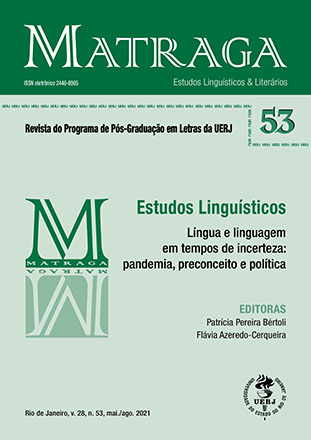Fazer morrer e não deixar viver: discursividades sobre a morte no discurso do presidente do Brasil
DOI:
https://doi.org/10.12957/matraga.2021.56489Palavras-chave:
Discursividades, Morte, Paráfrase, Pandemia.Resumo
Neste trabalho, temos como objetivo refletir sobre as discursividades que atravessam o enunciado “E daí? Lamento. Quer que eu faça o quê? Eu sou Messias, mas não faço milagre”, proferido pelo presidente da República do Brasil, Jair Messias Bolsonaro e seus efeitos de sentido, na perspectiva dos fundamentos teórico-metodológicos da Análise de Discurso de linha francesa materialista. Para tanto utilizamos os pressupostos teóricos de Pêcheux e Orlandi. A escolha dessa temática ocorreu mediante a repercussão das declarações do presidente brasileiro acerca do avanço da pandemia, após o país ter sofrido um grande aumento no número de infectados e ter batido recorde em número de mortes, ultrapassando a China. Nesse sentido, mobilizamos o movimento parafrástico como dispositivo analítico, visando compreender o funcionamento discursivo do referido enunciado. A perspectiva pecheuxtiana tem como pressuposto relacionar a linguagem à sua exterioridade, representada, metodologicamente, pela situação e pelo sujeito, que são designadas de condições de produção. Dessa maneira, compreendemos como o enunciado selecionado, produz sentidos, por meio dos processos de significação instaurados no texto, descrevendo seu funcionamento, visto que para a AD a língua é materialidade do discurso, portanto não se pode deixar de considerar sua relação com a historicidade. A materialidade significante, aqui descrita e analisada, permite entrever que para o sujeito enunciador, a pandemia surge como um aparato de serviço da morte aos indesejados. O que nos possibilita dizer, parafraseando Foucault, é esta a política do “fazer morrer e não deixar viver”.
Downloads
Downloads
Publicado
Como Citar
Edição
Seção
Licença
AUTORIZAÇÃO
A Matraga – Revista do Programa de Pós-Graduação em Letras da UERJ está autorizada a publicar o artigo ora submetido, caso seja aceito para publicação online. Fica atestado que a contribuição é original, que não está sendo submetida a outro editor para publicação, e que a presente declaração é a expressão da verdade.
Os trabalhos publicados no espaço virtual da Matraga – Revista do Programa de Pós-Graduação em Letras da UERJ serão automaticamente cedidos, ficando os seus direitos autorais reservados à Matraga. Sua reprodução, total ou parcial, é condicionada à citação dos autores e dos dados da publicação.

A Matraga utiliza uma Licença Creative Commons - Atribuição-NãoComercial 4.0 Internacional.





